TOYOTA 86 2017 Service Manual
Manufacturer: TOYOTA, Model Year: 2017, Model line: 86, Model: TOYOTA 86 2017Pages: 428, PDF Size: 5.25 MB
Page 41 of 428
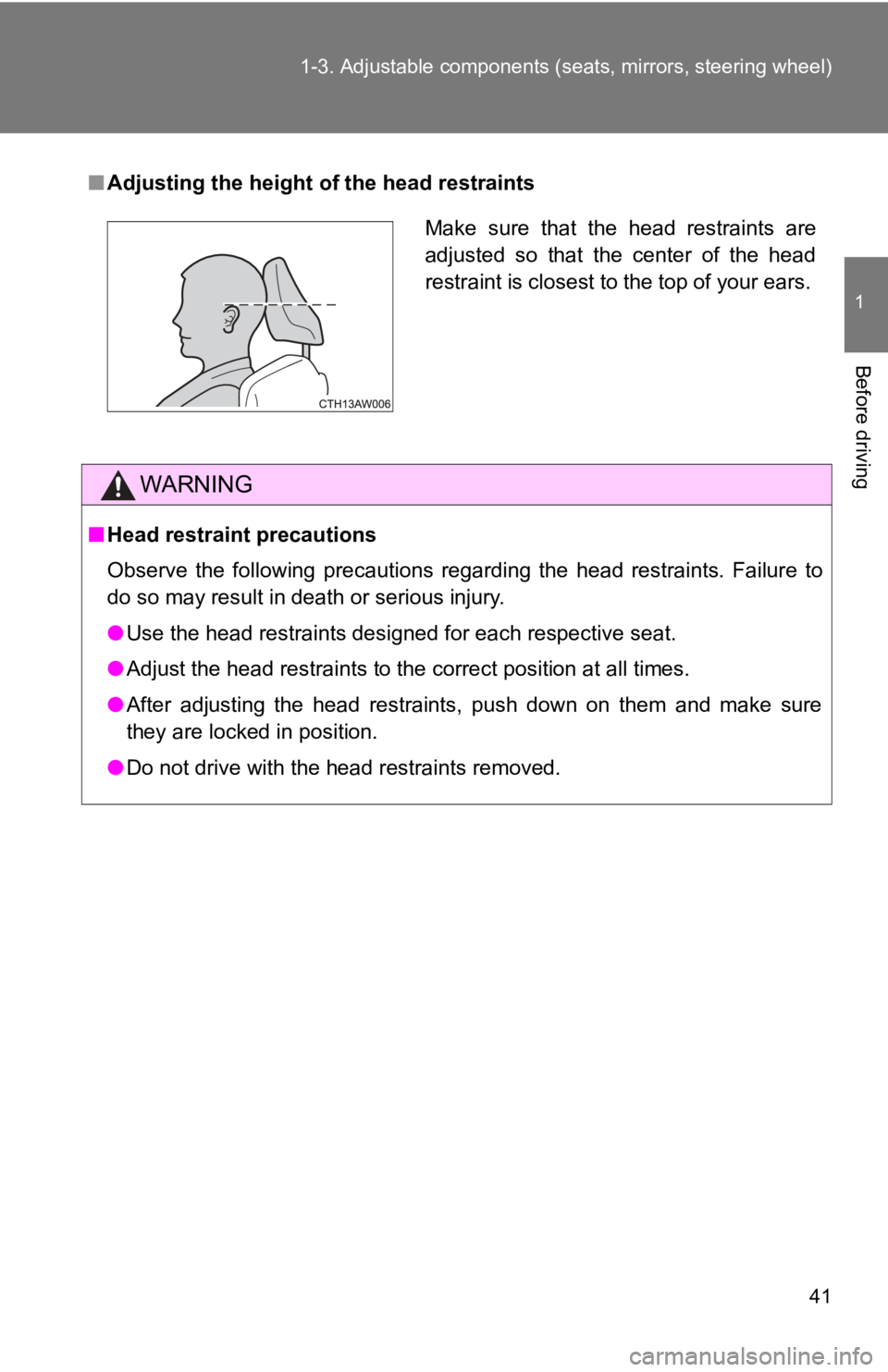
411-3. Adjustable components (s eats, mirrors, steering wheel)
1
Before driving ■ Adjusting the height of the head restraints
WARNING■ Head restraint precautions
Observe the following precautions regarding the head restraints. Failure to
do so may result in death or serious injury.
● Use the head restraints designed for each respective seat.
● Adjust the head restraints to the correct position at all times.
● After adjusting the head restraints, push down on them and make sure
they are locked in position.
● Do not drive with the head restraints removed. Make sure that the head restraints are
adjusted so that the center of the head
restraint is closest to the top of your ears.
Page 42 of 428
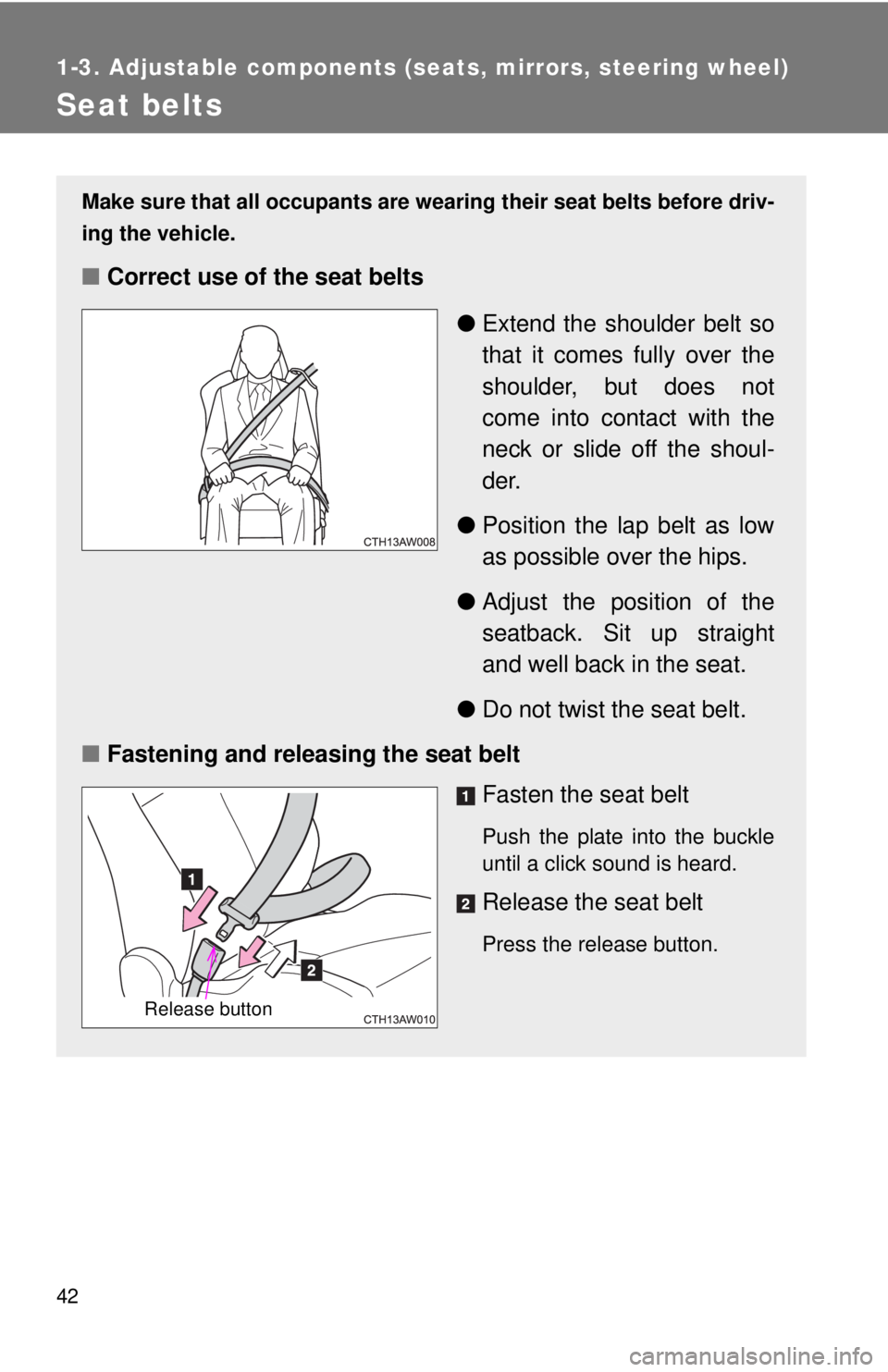
421-3. Adjustable components (seats, mirrors, steering wheel)
Seat belts Make sure that all occupants are wear ing their seat belts before driv-
ing the vehicle.
■ Correct use of the seat belts
● Extend the shoulder belt so
that it comes fully over the
shoulder, but does not
come into contact with the
neck or slide off the shoul-
der.
● Position the lap belt as low
as possible over the hips.
● Adjust the position of the
seatback. Sit up straight
and well back in the seat.
● Do not twist the seat belt.
■ Fastening and releasing the seat belt
Fasten the seat belt Push the plate into the buckle
until a click sound is heard.
Release the seat belt Press the release button.
Release button
Page 43 of 428
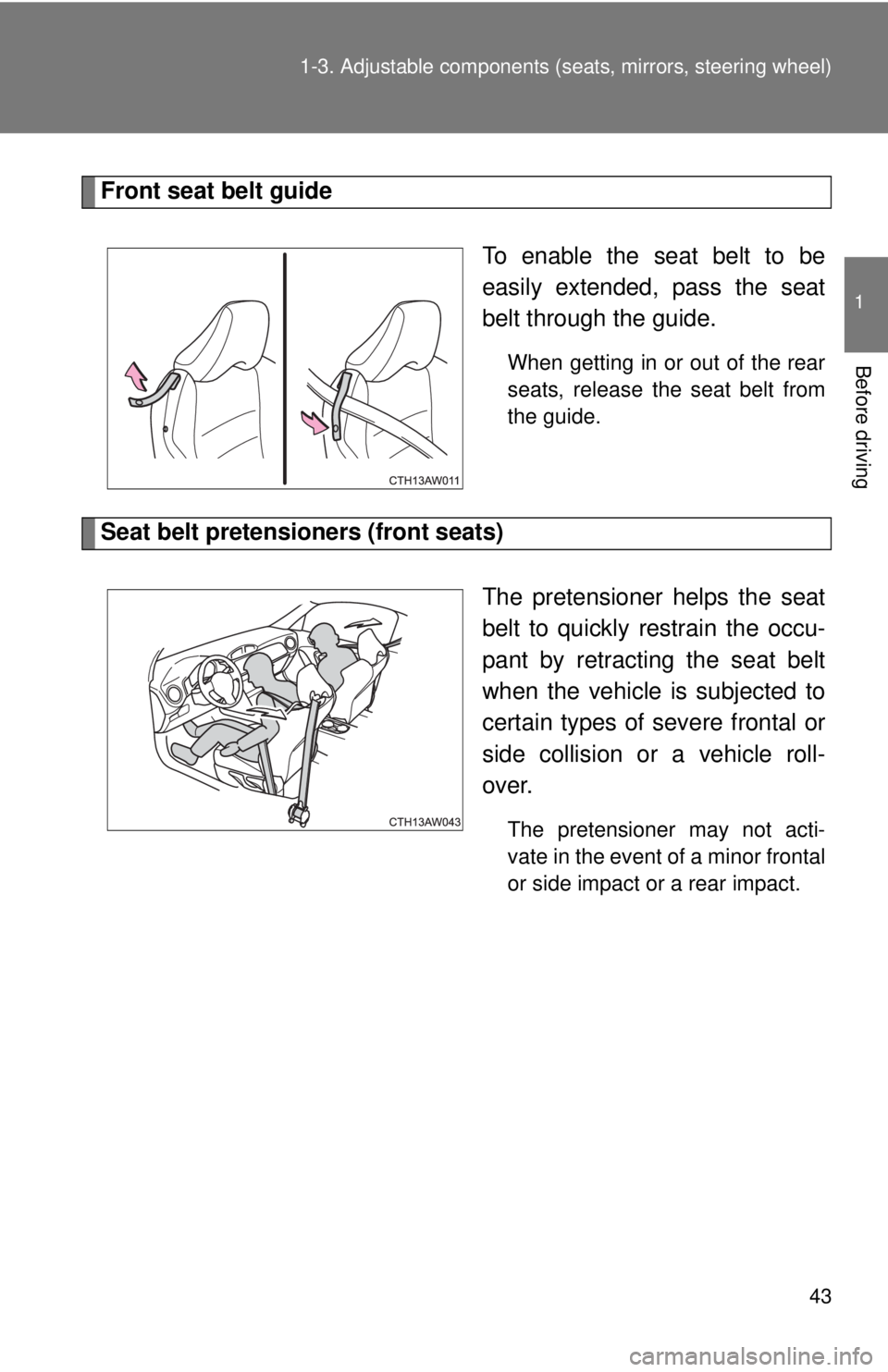
431-3. Adjustable components (s eats, mirrors, steering wheel)
1
Before driving Front seat belt guide
To enable the seat belt to be
easily extended, pass the seat
belt through the guide. When getting in or out of the rear
seats, release the seat belt from
the guide.
Seat belt pretensioners (front seats)
The pretensioner helps the seat
belt to quickly restrain the occu-
pant by retracting the seat belt
when the vehicle is subjected to
certain types of severe frontal or
side collision or a vehicle roll-
over. The pretensioner may not acti-
vate in the event of a minor frontal
or side impact or a rear impact.
Page 44 of 428

441-3. Adjustable components (s eats, mirrors, steering wheel)
■ Emergency locking retractor (ELR)
The retractor will lock the belt during a sudden stop or on impact. It may also
lock if you lean forward too quickly. A slow, easy motion will allow the belt to
extend so that you can move around fully.
■ Automatic locking retractor (ALR)
When a passenger's shoulder belt is completely extended and then
retracted even slightly, the belt is locked in that position and cannot be
extended. This feature is used to hold the child restraint system (CRS) firmly.
To free the belt again, fully retract the belt and then pull the belt out once
more. ( → P. 116)
■ Child seat belt usage
The seat belts of your vehicle are principally designed for persons of adult
size.
● Use a child restraint system appropriate for the child, until the child
becomes large enough to properly w ear the vehicle's seat belt.
( → P. 11 2 )
● When the child becomes large enough to properly wear the vehicle's seat
belt, follow the instructions on P. 42 regarding seat belt usage.
■ Seat belt pretensioners
● Seatbelt pretensioners are not designed to activate in a rear impact or
minor frontal or side impact.
● The following four components operate simultaneously when the vehicle
is involved in a rollover accident.
• Seat belt pretensioner for driver
• Seat belt pretensioner for front passenger
• SRS curtain shield airbag for driver’s seat side
• SRS curtain shield airbag for front passenger’s seat side
Page 45 of 428
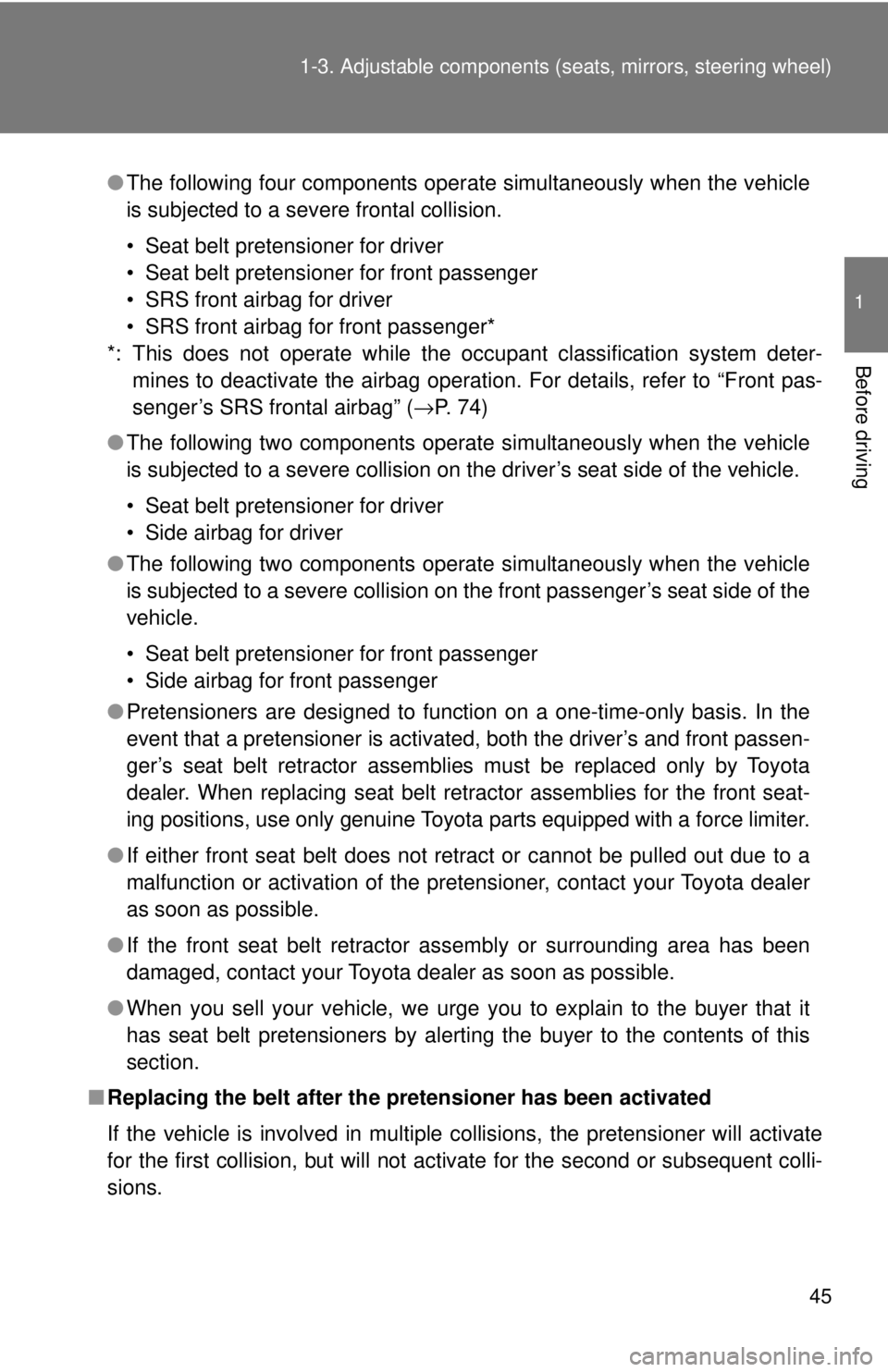
451-3. Adjustable components (s eats, mirrors, steering wheel)
1
Before driving ● The following four components operate simultaneously when the vehicle
is subjected to a severe frontal collision.
• Seat belt pretensioner for driver
• Seat belt pretensioner for front passenger
• SRS front airbag for driver
• SRS front airbag for front passenger*
*: This does not operate while the occupant classification system deter-
mines to deactivate the airbag operation. For details, refer to “Front pas-
senger’s SRS frontal airbag” ( → P. 74)
● The following two components operate simultaneously when the vehicle
is subjected to a severe collision on the driver’s seat side of the vehicle.
• Seat belt pretensioner for driver
• Side airbag for driver
● The following two components operate simultaneously when the vehicle
is subjected to a severe collision on the front passenger’s seat side of the
vehicle.
• Seat belt pretensioner for front passenger
• Side airbag for front passenger
● Pretensioners are designed to function on a one-time-only basis. In the
event that a pretensioner is activated, both the driver’s and front passen-
ger’s seat belt retractor assemblies must be replaced only by Toyota
dealer. When replacing seat belt retractor assemblies for the front seat-
ing positions, use only genuine Toyota parts equipped with a force limiter.
● If either front seat belt does not retract or cannot be pulled out due to a
malfunction or activation of the pretensioner, contact your Toyota dealer
as soon as possible.
● If the front seat belt retractor assembly or surrounding area has been
damaged, contact your Toyota dealer as soon as possible.
● When you sell your vehicle, we urge you to explain to the buyer that it
has seat belt pretensioners by alerting the buyer to the contents of this
section.
■ Replacing the belt after the pr etensioner has been activated
If the vehicle is involved in multiple collisions, the pretensioner will activate
for the first collision, but will not activate for the second or subsequent colli-
sions.
Page 46 of 428
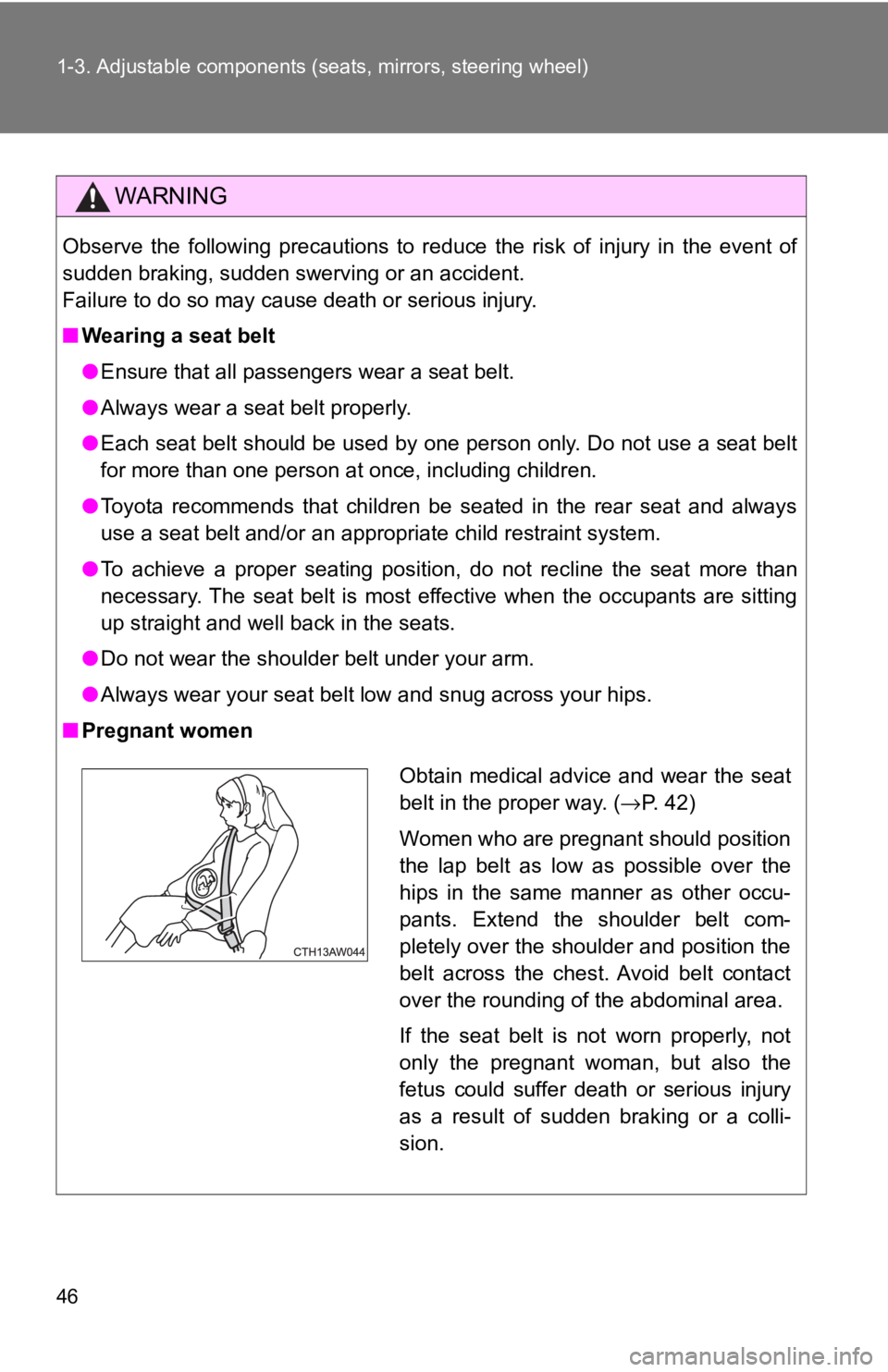
461-3. Adjustable components (s eats, mirrors, steering wheel)
WARNINGObserve the following precautions to reduce the risk of injury in the event of
sudden braking, sudden swerving or an accident.
Failure to do so may cause death or serious injury.
■ Wearing a seat belt
● Ensure that all passengers wear a seat belt.
● Always wear a seat belt properly.
● Each seat belt should be used by one person only. Do not use a seat belt
for more than one person at once, including children.
● Toyota recommends that children be seated in the rear seat and always
use a seat belt and/or an appropriate child restraint system.
● To achieve a proper seating position, do not recline the seat more than
necessary. The seat belt is most effective when the occupants are sitting
up straight and well back in the seats.
● Do not wear the shoulder belt under your arm.
● Always wear your seat belt low and snug across your hips.
■ Pregnant women
Obtain medical advice and wear the seat
belt in the proper way. ( → P. 42)
Women who are pregnant should position
the lap belt as low as possible over the
hips in the same manner as other occu-
pants. Extend the shoulder belt com-
pletely over the shoulder and position the
belt across the chest. Avoid belt contact
over the rounding of the abdominal area.
If the seat belt is not worn properly, not
only the pregnant woman, but also the
fetus could suffer death or serious injury
as a result of sudden braking or a colli-
sion.
Page 47 of 428
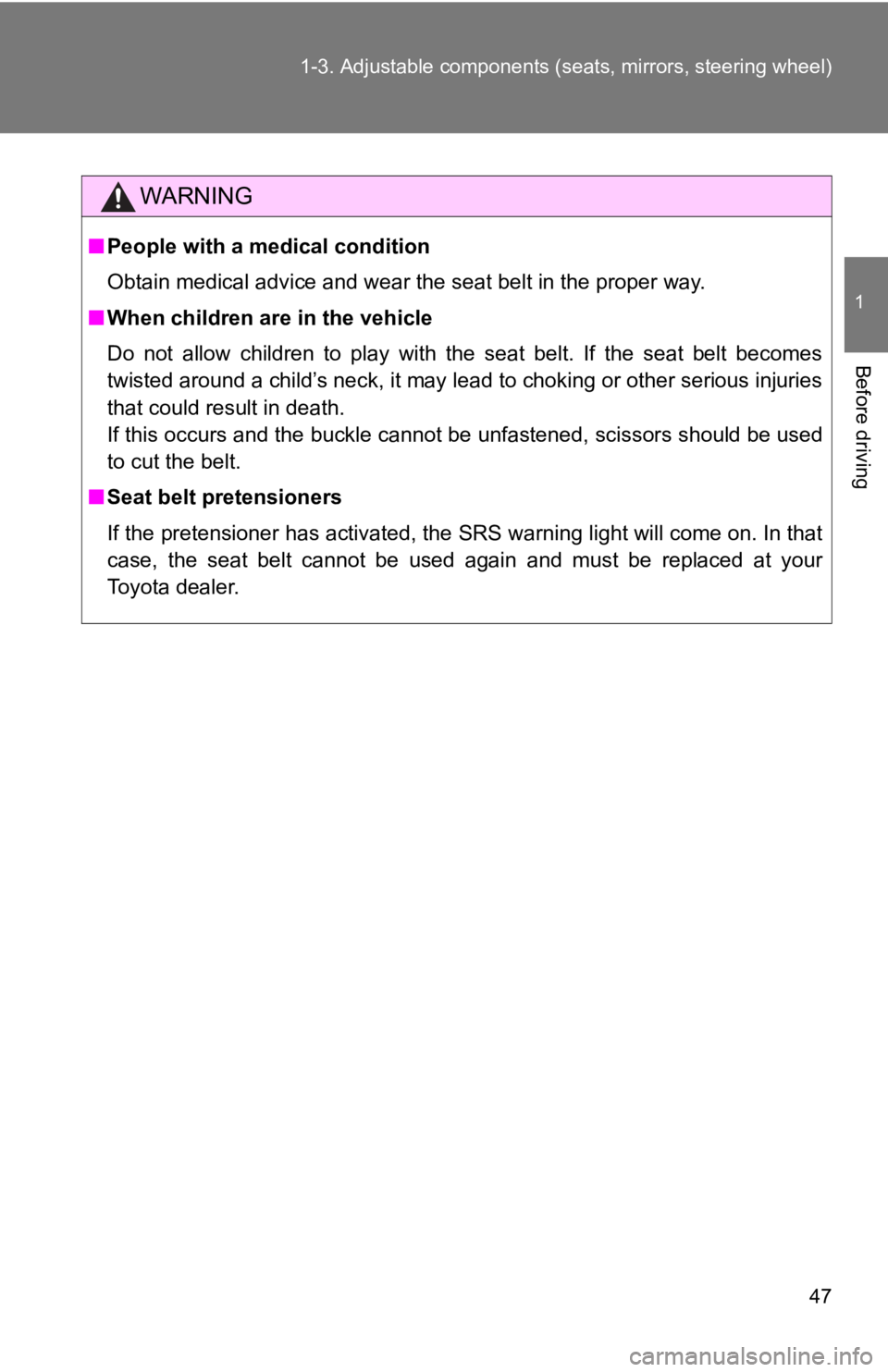
471-3. Adjustable components (s eats, mirrors, steering wheel)
1
Before driving WARNING■ People with a medical condition
Obtain medical advice and wear the seat belt in the proper way.
■ When children are in the vehicle
Do not allow children to play with the seat belt. If the seat belt becomes
twisted around a child’s neck, it may lead to choking or other serious injuries
that could result in death.
If this occurs and the buckle cannot be unfastened, scissors should be used
to cut the belt.
■ Seat belt pretensioners
If the pretensioner has activated, the SRS warning light will come on. In that
case, the seat belt cannot be used again and must be replaced at your
Toyota dealer.
Page 48 of 428
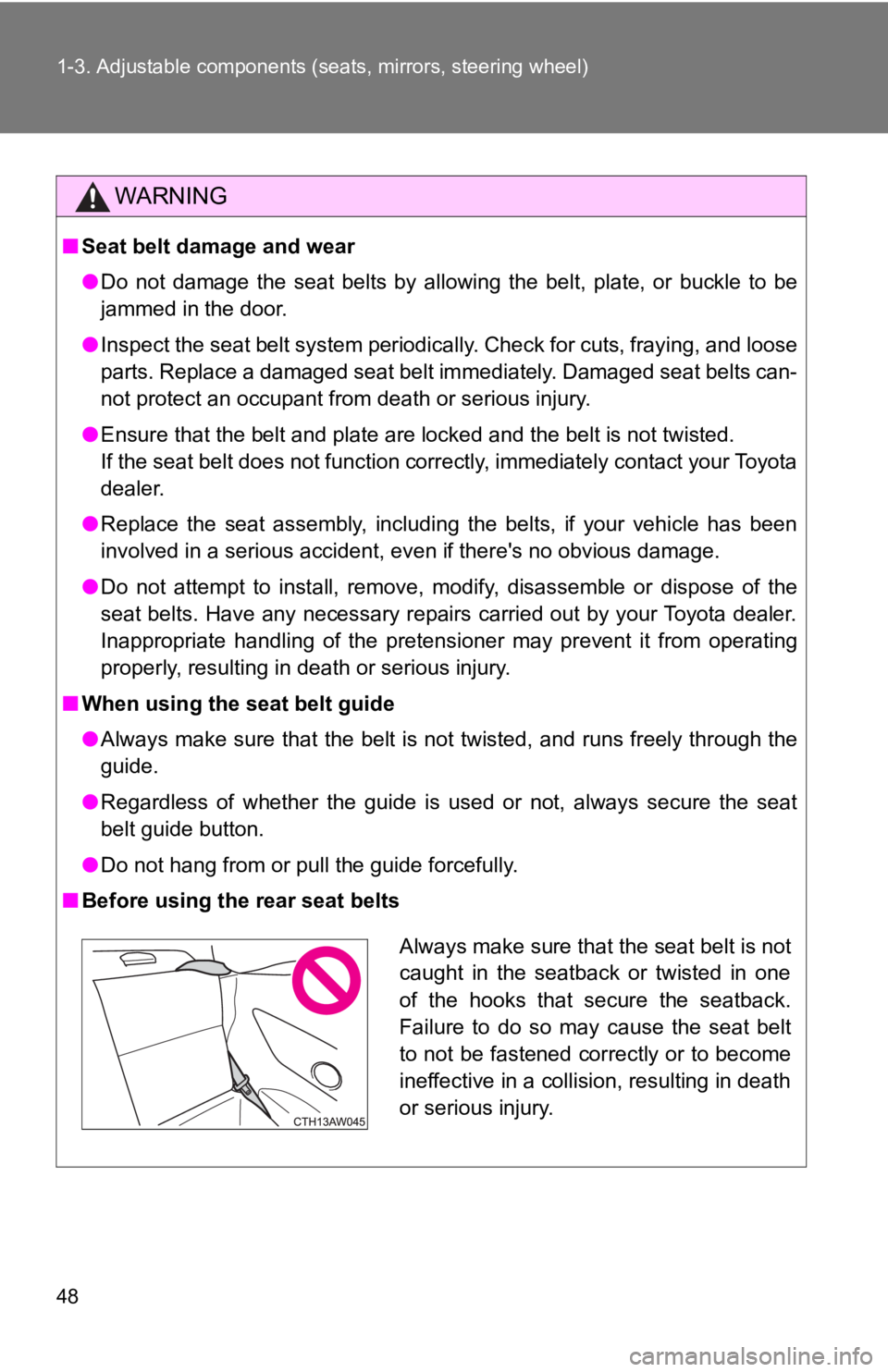
481-3. Adjustable components (s eats, mirrors, steering wheel)
WARNING■ Seat belt damage and wear
● Do not damage the seat belts by allowing the belt, plate, or buckle to be
jammed in the door.
● Inspect the seat belt system periodically. Check for cuts, fraying, and loose
parts. Replace a damaged seat belt immediately. Damaged seat belts can-
not protect an occupant from death or serious injury.
● Ensure that the belt and plate are locked and the belt is not twisted.
If the seat belt does not function correctly, immediately contact your Toyota
dealer.
● Replace the seat assembly, including the belts, if your vehicle has been
involved in a serious accident, even if there's no obvious damage.
● Do not attempt to install, remove, modify, disassemble or dispose of the
seat belts. Have any necessary repairs carried out by your Toyota dealer.
Inappropriate handling of the pretensioner may prevent it from operating
properly, resulting in death or serious injury.
■ When using the seat belt guide
● Always make sure that the belt is not twisted, and runs freely through the
guide.
● Regardless of whether the guide is used or not, always secure the seat
belt guide button.
● Do not hang from or pull the guide forcefully.
■ Before using the rear seat belts
Always make sure that the seat belt is not
caught in the seatback or twisted in one
of the hooks that secure the seatback.
Failure to do so may cause the seat belt
to not be fastened correctly or to become
ineffective in a collision, resulting in death
or serious injury.
Page 49 of 428
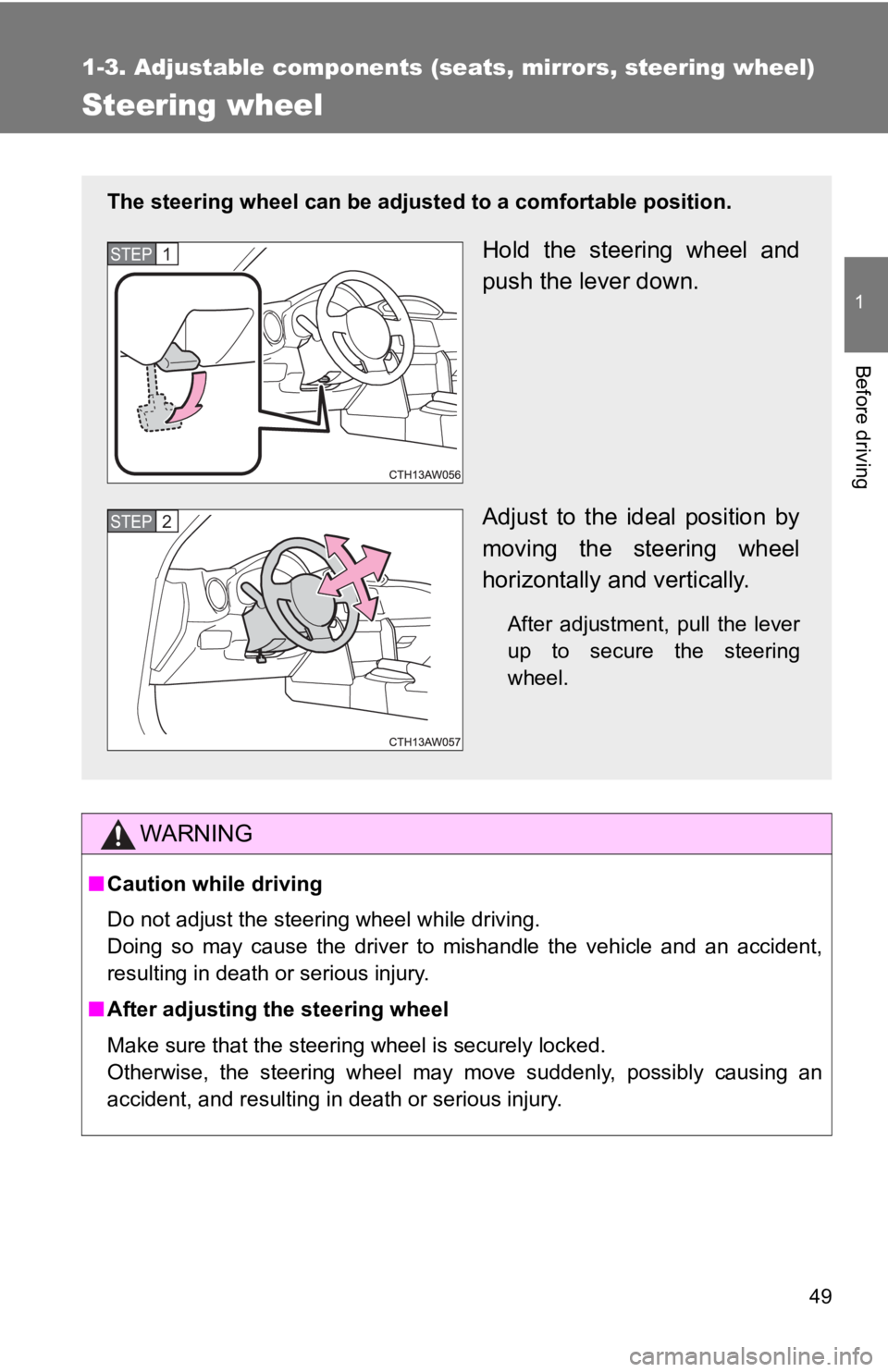
49 11-3. Adjustable components (seats, mirrors, steering wheel)
Before driving
Steering wheel
WARNING■ Caution while driving
Do not adjust the steering wheel while driving.
Doing so may cause the driver to mishandle the vehicle and an accident,
resulting in death or serious injury.
■ After adjusting the steering wheel
Make sure that the steering wheel is securely locked.
Otherwise, the steering wheel may move suddenly, possibly causing an
accident, and resulting in death or serious injury.The steering wheel can be adjust ed to a comfortable position.
Hold the steering wheel and
push the lever down.
Adjust to the ideal position by
moving the steering wheel
horizontally and vertically. After adjustment, pull the lever
up to secure the steering
wheel.STEP 1
STEP 2
Page 50 of 428
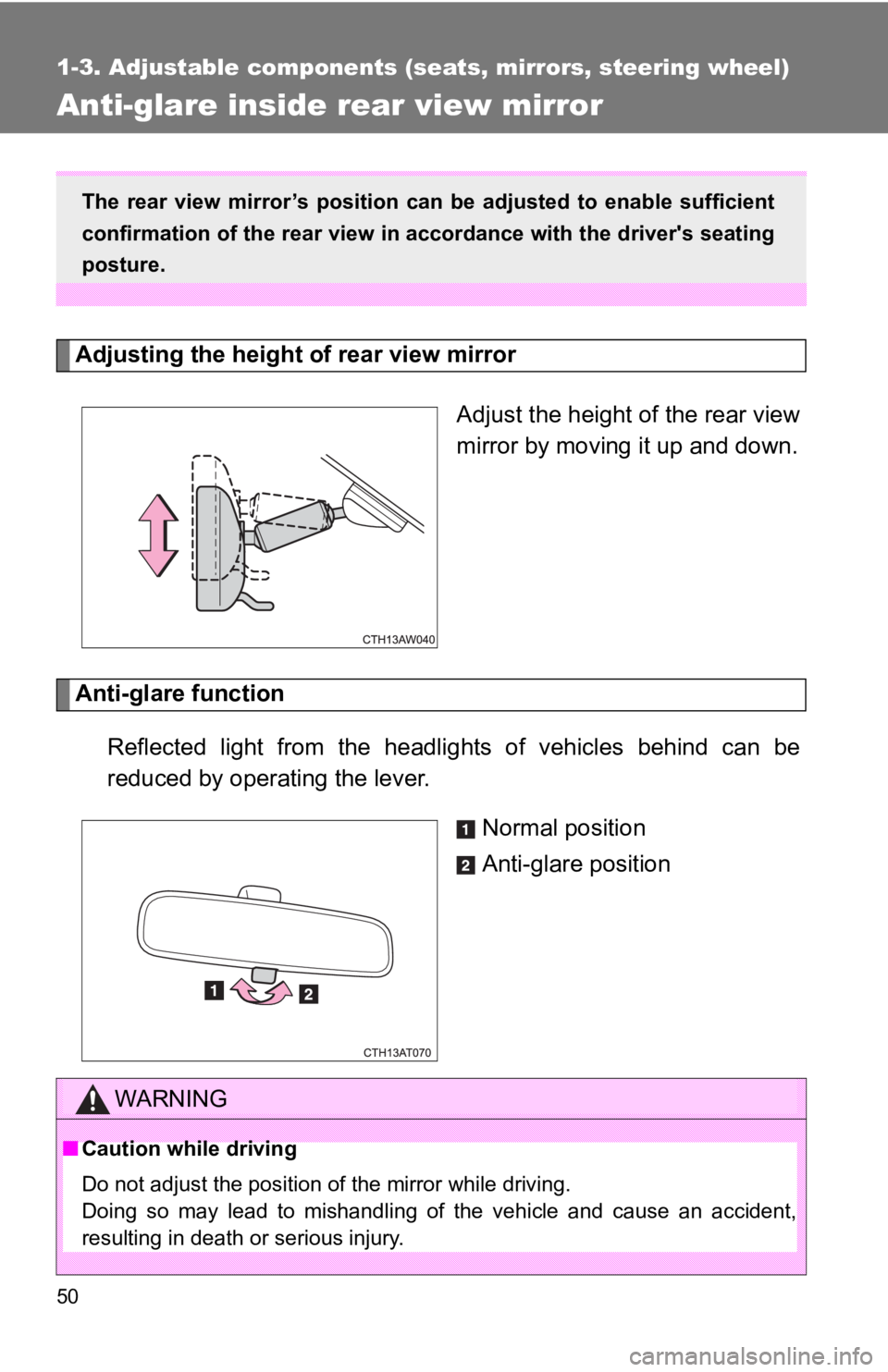
501-3. Adjustable components (seats, mirrors, steering wheel)
Anti-glare inside rear view mirror Adjusting the height of rear view mirror
Adjust the height of the rear view
mirror by moving it up and down.
Anti-glare function
Reflected light from the headlights of vehicles behind can be
reduced by operating the lever.
Normal position
Anti-glare positionThe rear view mirror’s position can be adjusted to enable sufficient
confirmation of the rear view in accordance with the driver's seating
posture.
WARNING
■ Caution while driving
Do not adjust the position of the mirror while driving.
Doing so may lead to mishandling of the vehicle and cause an accident,
resulting in death or serious injury.